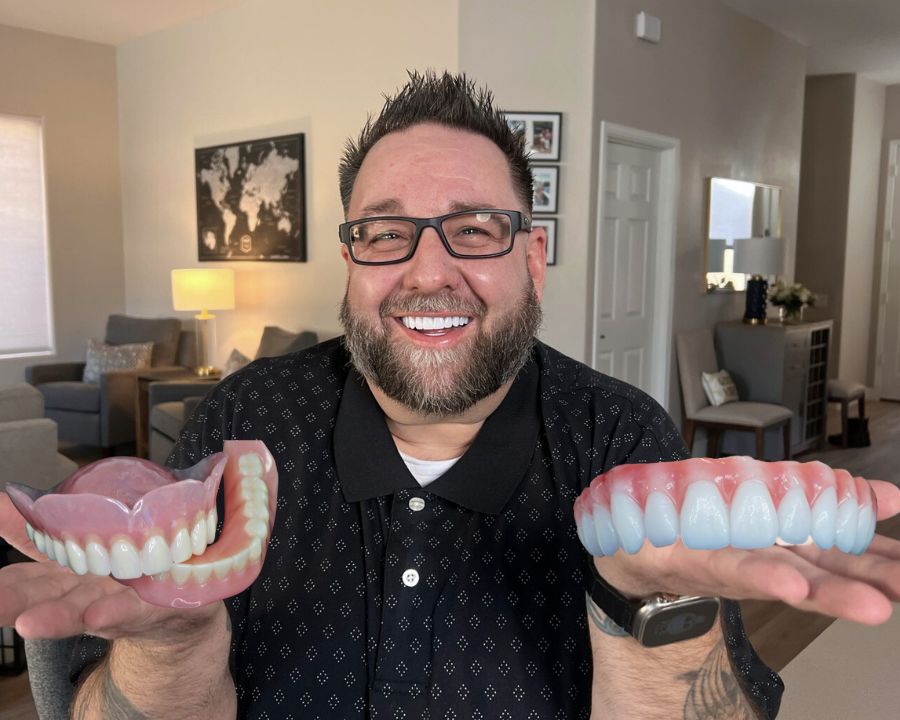Infections around dental implants can happen. They’re rare—especially when you work with experienced providers—but they can be serious if ignored. The good news? They’re treatable. And even better news? They’re often preventable with the right care.
Let’s walk through the symptoms, how to avoid problems, and what to do if you think your dental implant might be infected.
Dental Implant Infection Symptoms: 4 Warning Signs to Watch For
Infection around a dental implant is called peri-implantitis—an inflammatory condition that affects the gum and bone around the implant. It can lead to bone loss and, if untreated, implant failure. But the earlier you catch it, the easier it is to treat.
Here are 4 common signs of dental implant infection:
1. Persistent Pain or Discomfort
Some discomfort is normal after surgery—but ongoing or worsening pain days or weeks after your procedure is a red flag. If the area around your implant aches, throbs, or feels sensitive to pressure, don’t ignore it.
2. Swelling, Redness, or Bleeding Gums
Inflamed or bleeding gums around the implant site could signal infection. Redness, puffiness, or gums that bleed when you brush or eat are early signs your body is fighting something it shouldn’t be.
3. Pus or an Unpleasant Taste or Smell
If you notice pus around the implant or a bad taste in your mouth that won’t go away, that is likely to be an indicator of infection. This often means bacteria has entered the gum tissue or bone around the implant.
4. Implant Feeling Loose or Unstable
A properly integrated dental implant should feel solid—just like a natural tooth. If it starts to feel wobbly or loose, that could mean the bone around it is breaking down due to infection. This is a serious symptom that needs immediate attention.
Avoiding a Dental Implant Infection
Here’s the truth: Most implant infections are preventable. Here’s what you can do to protect your new implants from infection.:
1. Choose a Provider with a Proven Track Record
The experience and protocols of your dental implant team matter. At Nuvia, our full-arch dental implant success rate is 99.1%—higher than large published studies that range between 93.3% and 98%. Why? These factors contribute to the extremely high success rate:
- A team of highly-experienced oral surgeons, restorative dentists, and CRNAs
- A dedicated in-house lab at every location that uses high-quality, durable materials
- A process that delivers permanent teeth in just 24 hours
Not only does Nuvia take the steps necessary to give you a beautiful, and long-lasting smile, your safety and comfort are top priorities at Nuvia.
2. Follow All Aftercare Instructions
Even if everything goes great during the procedure, you can be at risk of getting an infection if you don’t follow aftercare instructions.
Your provider will make sure you have all the information you need. Their instructions will likely include:
- Take any prescribed antibiotics as directed
- Keep the area clean (your provider will tell you how)
- Avoid smoking—it dramatically increases infection risk
- Eat soft foods as recommended. Patients are usually cleared to eat whatever they’d like at the 4th month appointment, but your doctor will give you personalized guidance.
- Attend all follow-up appointments
When you partner with the right team and take your recovery seriously, you’re setting yourself up for long-term success.
Treatment Options for Dental Implant Infection
If you do find yourself with symptoms of an infected dental implant, here are some of the steps you should take:
1. Call Your Provider Immediately
Time matters. The earlier an infection is diagnosed, the more options you are likely to have. Minor infections can often be treated with deep cleaning and antibiotics. More advanced cases may require surgical intervention or implant replacement.
2. Don’t Try to “Tough It Out”
Ignoring pain or symptoms can lead to bone loss and potentially dental implant failure. Infections don’t typically “just go away.” It’s better to be safe and get it checked.
3. Get a Second Opinion if You’re Unsure
Not all providers are the same. If your concerns aren’t being taken seriously or you’re not getting answers, trust your instincts. A second opinion could save your dental implant.
Why Taking Care of Your Dental Implants Matters
Although a dental implant infection is not ideal, they are rare for those that follow aftercare instructions following the procedure and who practice good oral hygiene beyond the healing phase..
When you’ve lived with failing or missing teeth, you know how much it steals from your life—avoiding mirrors, skipping meals with friends, hiding your smile in photos. Dental implants are a way out. A permanent, life-changing solution. It’s important to take care of them.
Protecting your investment—your health—starts with choosing the right team from the start. Find out more about your Nuvia team here.
If you’re considering dental implants, take the 60-second quiz to see if you may be a candidate.












.jpg)




